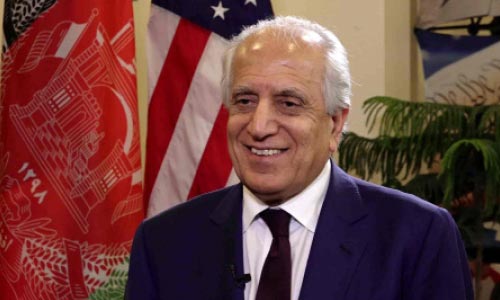KABUL - The US Special Representative for Afghanistan Reconciliation, Ambassador Zalmay Khalilzad, in an interview with TOLOnews said Taliban has accepted that they cannot win by warfare and that political settlement should be sought for ending the crisis in the country.
Khalilzad said in the Abu Dhabi talks, they discussed with Taliban representatives on announcing a three-month ceasefire and Taliban representatives have said they would consult with their leaders in this regard.
Khalilzad, who arrived in Kabul from Abu Dhabi on Wednesday, said in they did not hold discussions on changing the political system and Afghanistan’s internal affairs, but added that Taliban has reached a point where they cannot win through warfare, and that political options should be sought for putting an end to the current situation.
“Taliban said there is no military solution, we cannot defeat you. We first should sit with the US and then with the Afghan government to resolve the problem,” said Khalilzad.
In the Abu Dhabi talks, representatives from the United States, United Arab Emirates (UAE), Saudi Arabia, Pakistan and representatives of Taliban attended. Also, a negotiating team from the Afghan government went to Abu Dhabi to hold close talks with Taliban, but the Taliban representatives refused to meet the Afghan government negotiating team.
Khalilzad said, “I think they made a mistake in not meeting the Afghan government delegation. The countries who were present there, their reactions to this stance of Taliban was very negative, and questions were raised on whether the Taliban really wanted peace."
According to Khalilzad, the release of Taliban’s prisoners including Anas Haqqani, son of the founder of Haqqani network Jalaluddin Haqqani, who is in an Afghan government prison, was also discussed in Abu Dhabi.
Khalilzad said after reaching a peace deal with Taliban, the presence of the US in Afghanistan would somehow change.
According to Khalilzad, Taliban representatives in Abu Dhabi said they would share the issue of a three-month ceasefire with their leaders. “We talked about a ceasefire. The Saudi Arabia and United Arab Emirates’ suggestion was that negotiations should be held on all issues for three months and a ceasefire should be announced during the negotiations,” Khalilzad said.
Now the question is, if a peace agreement is made with Taliban, would the current political system change to an Islamic Emirate?
Khalilzad said, “It is not an issue that has been proposed and there is no chance of that. I would be surprised if anyone thought such a system would come about.”
Khalilzad also said Trump’s administration had promised the Americans that the Afghan war would end, but if the war continues, Washington would stand with the Afghan people.
Khalilzad also praised Pakistan for its recent efforts in the Abu Dhabi peace talks.
In Abu Dhabi, for the first time a comprehensive delegation from Taliban’s leadership team and members of Haqqani network met with representatives from the US.
In their meeting with representatives from US, Pakistan, Saudi Arabia and the UAE in Abu Dhabi, the Taliban once again called for the withdrawal of foreign forces from Afghanistan.
On Wednesday Khalilzad met with Pakistani leaders in Islamabad and then arrived in Kabul where he met with President Ashraf Ghani, Chief Executive Officer Abdullah Abdullah and National Security Advisor Hamdullah Mohib.
In the meantime, a number of Afghan politicians and former Jihadi leaders on Thursday met with Khalilzad in former president Hamid Karzai’s house in Kabul.
Sources told TOLOnews that Khalilzad asked the politicians and leaders to create unity in the Afghan peace negotiating team.
The leaders who met Khalilzad included former president Hamid Karzai, chief executive of Jamiat-e-Islami party Atta Mohammad Noor, former vice president Mohammad Younus Qanooni, chief of the High Peace Council Karim Khalili, second deputy of the Chief Executive Officer Mohammad Mohqiq, former Hajj and religious affairs minister Nematullah Shahrani, former national security advisor Mohammad Hanif Atmar, former urban development minister Sayed Masour Naderi, chairman of Mahaz-e-Milli party Sayed Hamid Gailani, former national security advisor Rangin Dadfar Spanta and former acting foreign minister Zarar Ahmad Moqbil.
According to sources, Khalilzad assured the Afghan politicians and leaders that he has not discussed the establishment of an interim government with Taliban. (Tolo news)
Home » Afghanistan » Taliban Accepts they Cannot Win by Warfare :Khalilzad
Taliban Accepts they Cannot Win by Warfare :Khalilzad

